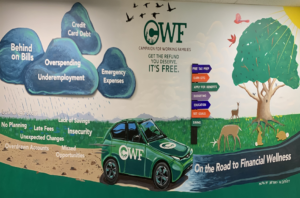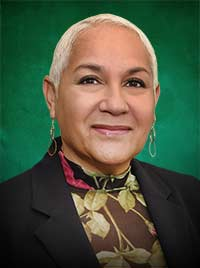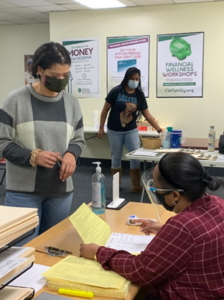
Campaign for Working Families (CWF) has a mission – to help lower-income households file their taxes. This already vital service to the community has become even more important with the recent tax law changes designed to stimulate the economy from the bottom up.
Campaign for Working Families CEO Mary Arthur says one of these changes specifically, the new child tax credit, is incredibly important.
“When you think about a person receiving $300 a month per child for the next six months, that is very impactful,” she says. “At $300 a month per child, a family can now pay its utility bills without juggling something else. These dollars, along with the Earned Income Tax Credit and next year the dependent care tax credit, are going to be three powerful tools that will be used to move the needle in a family’s life.”
Before the “Year of COVID,” CWF operated 19 tax preparation sites and 11 additional rotating sites served by its mobile unit. The sites are housed in different ways. CWF has partners who give the organization space, and in other cases CWF rents space. Either way, they bring in all the equipment and supplies needed to do their clients’ taxes.
“We can go into an empty room and build a tax site out with tables, chairs, computers and internet,” Arthur says.

A good example came last year when CWF set up shop four times at Philadelphia International Airport, at the airport’s request. The airport provided the space and CWF got to work. Airport employees dropped off their information and then returned later that same day to review and sign their prepared tax forms.
In 2021, CWF has been able to open four traditional sites, but like so many of us they have been working tirelessly from home. They added a virtual platform which has become very popular with their clients. (Users access the service through the CWF website – virtual section – https://cwfphilly.org/virtual/.) CWF opened 11 traditional sites this year and 4 will remain open until Oct.
“Our virtual component was born out of Covid,” said Arthur. “We show users how to upload their information and documents. Once that’s done, our volunteers contact the filer to do the intake process just as we do at a tax site by getting all of the person’s pertinent information. It moves from there to the tax preparer. From there it goes to the quality reviewer who then contacts the filer to go over everything and then have the client sign their finished product though DocuSign.”
When operating, the mobile team consists of a group of tax preparers who go deep into communities to provide services at churches, community-based organizations, or the offices of local elected officials.
Mary Arthur, herself, got her start at CWF as a manager of the mobile unit in 2005 before becoming CEO.
“There were a group of 10 of us and we were a self-sufficient team,” she said. “It is a very successful part of our mission. There are many people who will just not leave their neighborhoods, so we go in and do the work for them in those neighborhoods. My goal is to grow the mobile unit again after the pandemic.”
Arthur says she never thought she would have such a passion for taxes, but she says it’s really about the people. “I’ve always had a passion for people. I started out with the Department of Public Welfare, and I kind of fell into this work,” she said. “I see what this work can do for a family. When we do someone’s tax return and they get a refund or we do a person’s tax return and they owe money, but we can show them the light at the end of the tunnel that’s where the reward comes. We see people buying homes, going to college, and putting their kids in enrichment programs. That’s what I see when I talk about helping people with their taxes.”
As things stand, the child tax credit is only in effect for the rest of 2021. President Biden wants to extend the benefit to 2025.
“If we could make these changes permanent, it would be tremendous when you think of what a person could do with those kinds of dollars” says Arthur. “Or a person can opt out on the monthly payments and get all of it in their tax return. Now you’re talking about someone currently prevented from getting a better job because they lack transportation being able to get a decent car without even getting a car note. These are the kind of dollars that can be generated.”

CWF is very happy to be a lead agency in The Promise’s Family Stability Challenge. The agency has counted on the IRS and the United Way to provide funding in the past, but operating far fewer sites this year meant less help from the normal channels. Funding from The Promise: The Poverty Action Fund for Philadelphia allowed the organization to maintain services, plus coordinate services with its partner agencies.
In a normal year, CWF trains about 900 volunteers. This year they were only able to recruit 300 volunteers with just around 10% willing to come into the tax site. The rest worked virtually. And instead of the normal 85 staff who work the tax season, CWF was forced to hire fewer than 60.
Mary Arthur misses the face-to-face meetings with clients. “I like the interaction,” she says. “I like to give families the good news, but I know how to give them the bad news that they owe, gently.”
She also said doing so much of the work virtually and over the phone carried its own problem. “People don’t answer their phones. We have to tell people if they get a call from a strange number, it’s probably us so pick up!”
Fifty percent of CWF’s clients earn about $15,000 a year. That makes helping this population the top priority, so they don’t have to spend money with a commercial tax preparation service.
Learn more at https://cwfphilly.org.


